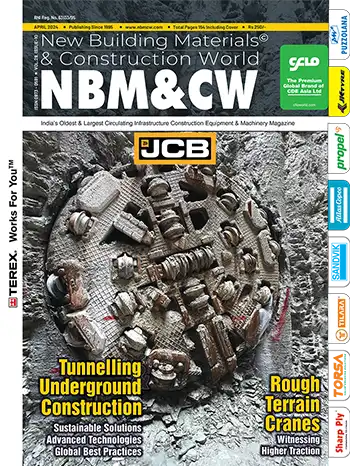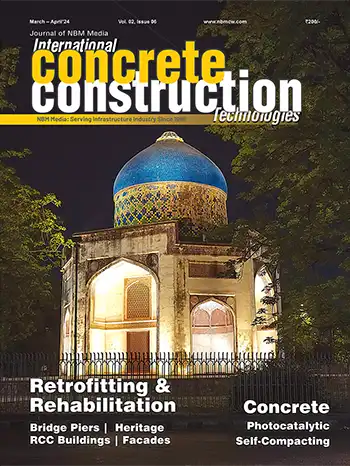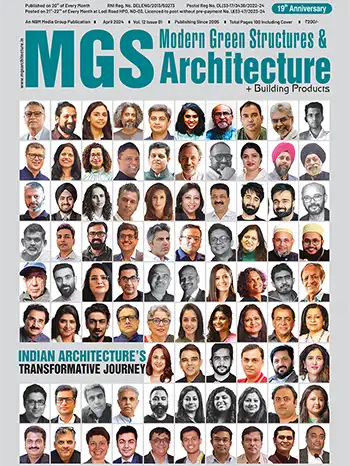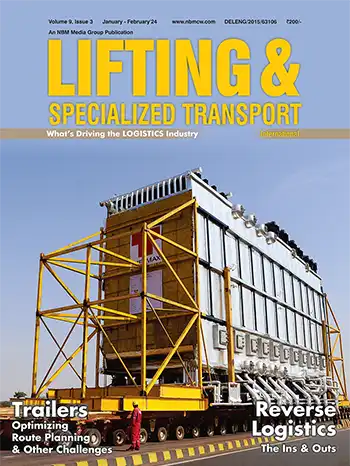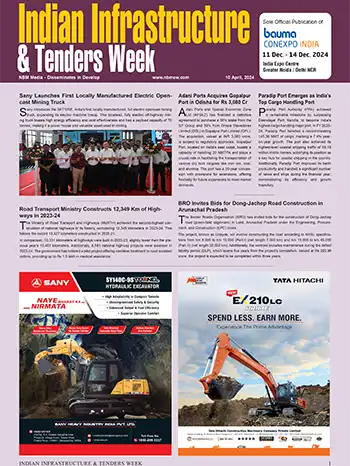Arvindbhai Vithalbhai Patel - MD, Patel Infrastructure Limited
Technology will not replace employees, rather, it will alter the working pattern at construction sites, mitigate risks, enhance security and safety, increase efficiency and productivity by reducing construction costs.
 Opportunities & Challenges
Opportunities & Challenges
Infrastructure is the ‘wheels’ of any economic activity. If the physical and social infrastructure is good, it not only enhances the quality of life, but also increases productivity, which in turn fosters inclusive economic growth. For instance, if road connectivity is good, transportation becomes easier, which in turn opens up economic opportunities in untapped or under-tapped markets.
The 13th Five Year Plan indicates large investment potential in infrastructure, which would translate into huge employment opportunities in the sector. The construction industry is the second largest employer with 35 million employees and estimated to become the largest employer by 2022, employing more than 75 million people and its GDP contribution increasing to 15% by 2030. About 250 ancillary industries such as cement, steel, brick, timber and building materials are dependent on it.
In the Union Budget 2019-20, the government allocated a massive amount of ₹4.56 lakh crore for infra development. Government reforms and initiatives are giving a huge boost to the sector and many projects are being announced and awarded. However, challenges are inevitable in the path of advancement. Stalled or delayed projects lead to a slowdown in economic progress, reasons for which could be financing issues, change in site conditions, change in weather conditions, material shortage, fluctuation in material prices, poor site supervision/management, land acquisition issues, delays in various clearances, execution delays, encroachments, etc.
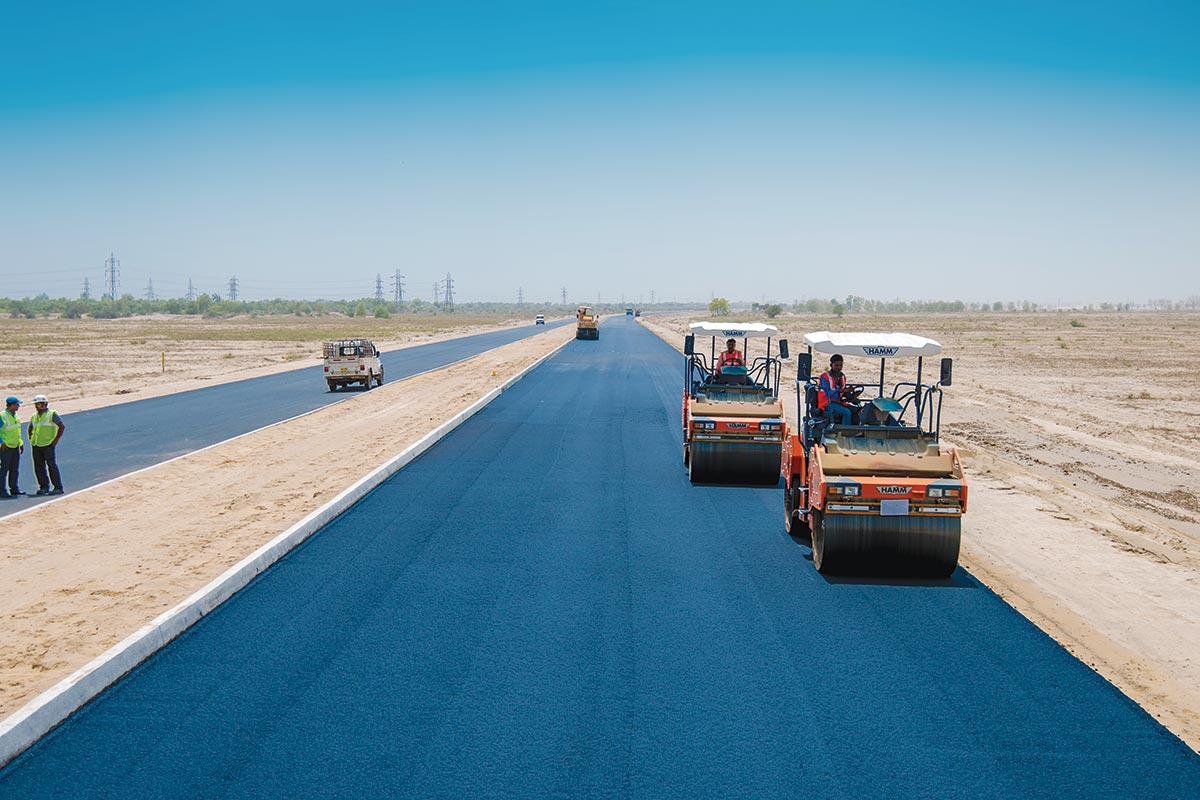 Bituminous Layer Compaction on Kaithal-RJ Border Road Project
Bituminous Layer Compaction on Kaithal-RJ Border Road Project
The industry is also faced with shortage of qualified technical manpower such as supervisors, surveyors, estimators, lab technicians, etc. It also fails to attract fresh talent due to the construction industry’s stressful working conditions at sites, long working hours, and lack of safety.
Construction waste, illegal dumping, and theft are also cause of concern. Machinery breakdowns result in time and cost overruns and trim profit margins. There is always a risk of going over budget and not meeting completion deadlines. Though the government is giving a push to this industry, sectors like banking, urban development etc need to be more supportive.
Project Management
Infrastructure projects have become bigger and more complex. Many contractors and builders often struggle during execution due to lack of project managerial skills, innovative software/technologies and project specific equipment. Project managers are responsible for planning, executing, monitoring and completing projects; they act as intermediaries between the management, workers, government agencies and the public.
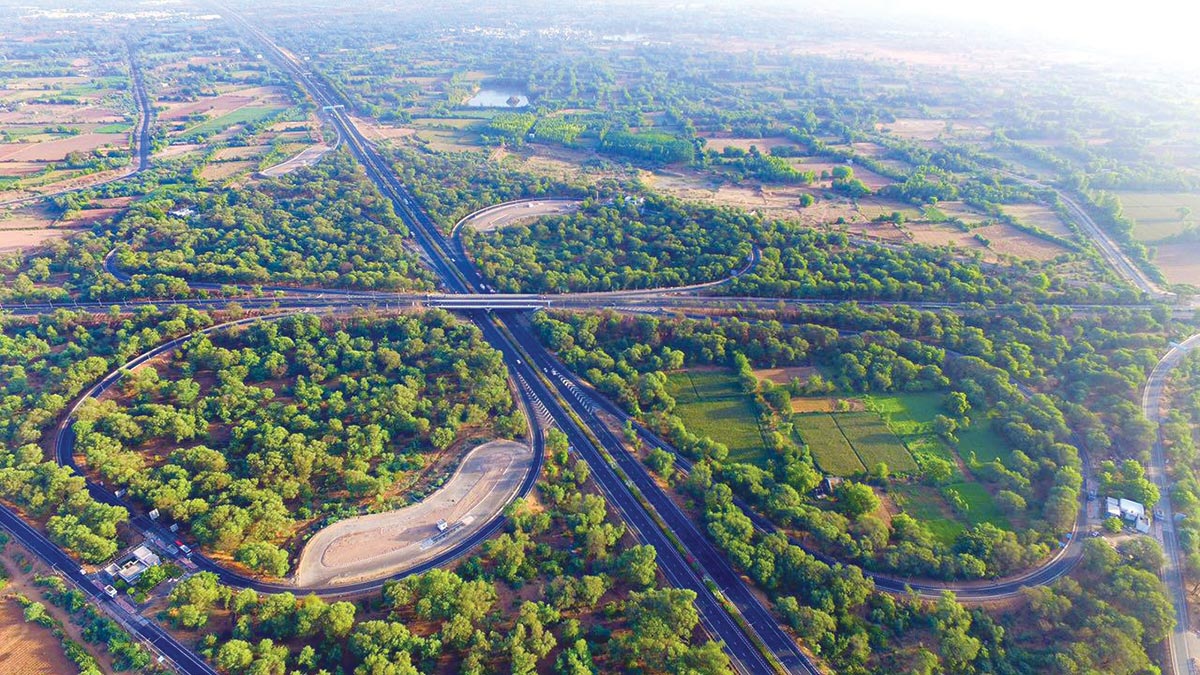 Ahmedabad - Vadodara Expressway NE - 1
Ahmedabad - Vadodara Expressway NE - 1
At Patel Infrastructure, we believe that a project fails at the beginning, not at the end. Planning for us is not a one-time activity but an ongoing process. We always have a back-up plan in case the planned schedule is disrupted due to any contingency. A clear-cut demarcation of role, responsibility and authority is assigned to each employee, and training programs are conducted frequently at site.
Artificial intelligence & IoT
Technology is paving the way for new opportunities. Advancements in machines are simplifying and reducing maintenance, while increasing productivity and performance, especially in the execution of mega projects. At Patel Infra, we use advanced machinery, latest technology and software to boost efficiency. We are using the latest version of SAP software i.e. SAP HANA.
There is immense scope for futuristic technologies and their implementation in infrastructure construction whether related to voice assistance or image recognition. We will have better roads and highways, better buildings, cities, traffic monitoring etc with the use of cloud-based applications, mobile devices, biometric machines and drones. Autonomous vehicles for drilling and hauling and robotics will help in curbing labour shortage and AI will make easier and faster the process of estimating, surveying and analyzing material and structure.
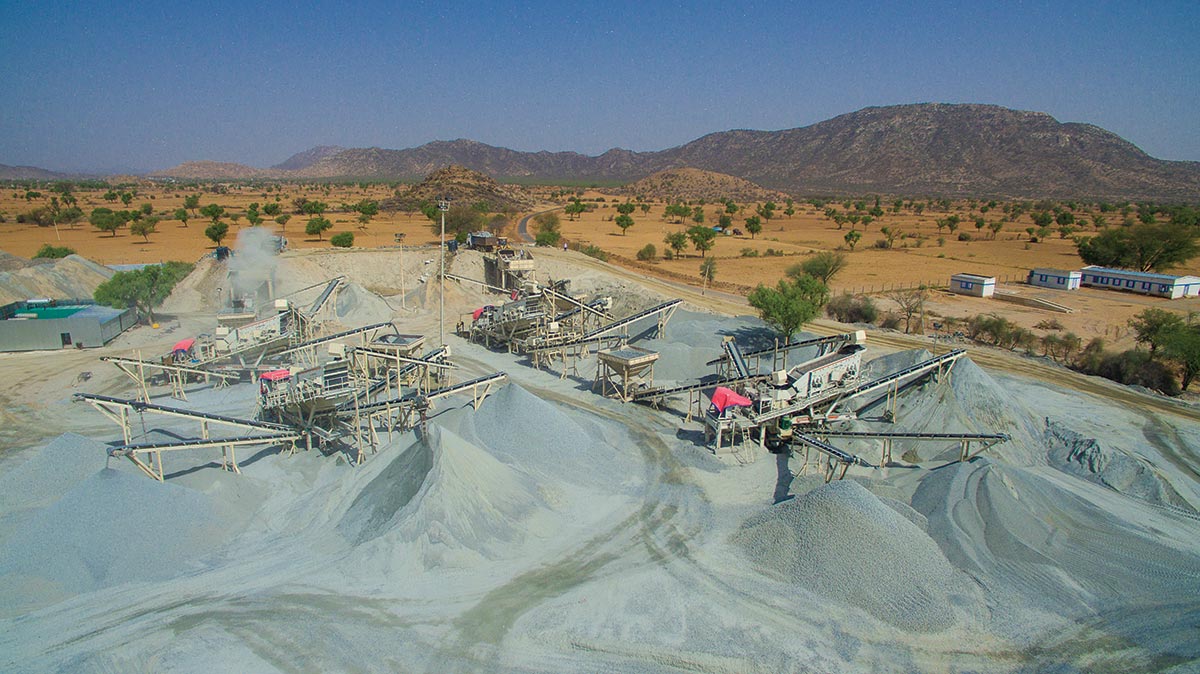 Aggregate Stone Crushers for Kaithal-RJ Border Road Project
Aggregate Stone Crushers for Kaithal-RJ Border Road Project
Machine learning and AI algorithms will assist in the construction, design and engineering of complex projects with greater precision. Robots can be used to track activities at site and detect any error or deviation. IoT will help optimize the construction process with better usage of energy, resource allocation, and reducing operational cost and management of assets and their repair.
Though still at a nascent stage, digitization of construction is closer than we think. Technology will not replace employees, rather, it will alter the working pattern at construction sites, mitigate risks, enhance security and safety, increase efficiency and productivity by reducing construction costs.
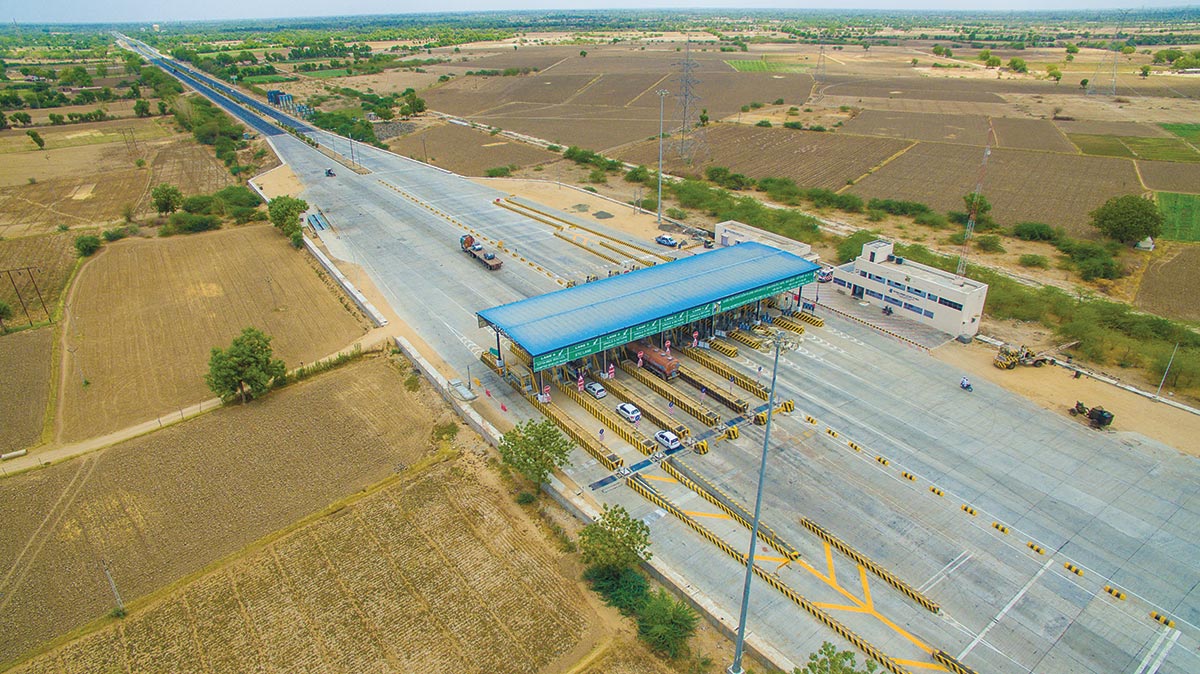 Bhalgam Toll Plaza
Bhalgam Toll Plaza
Order Book
Patel Infrastructure is engaged in construction of roads and highways, bridges, mining sites, commercial, residential and institutional buildings, government hospitals, ancillary services like toll collections and maintenance of roads and highways. The total order book of the company as of March 2019 is ₹7896.24 crores. This includes Concrete and Asphalts Pavements - 4/6/8 Lanes in National Highways, Expressways and Multistory building projects of more than 960 kms and skyscraper building across Gujarat. Our turnover in FY 2018-2019 was ₹1450 crores.
We have recently secured highway development contracts from NHAI under Bharatmala Pariyojana with a total contract amount of ₹7107.22 crores in Gujarat, Rajasthan and Tamil Nadu under the HAM and EPC models. This project includes an 8-lane greenfield expressway that connects Vadodara with Mumbai. For making the expressway with rigid pavement; we have procured ultra-modern machineries like the fully automatic slip form concrete paver with a capacity of 18.75 meters at single pass. We are also looking at other mega expressways, new developments of 6/8 lanes of ring roads/bypasses, and economic corridors planned under Bharatmala Pariyojana Phase-2.

Infrastructure is the ‘wheels’ of any economic activity. If the physical and social infrastructure is good, it not only enhances the quality of life, but also increases productivity, which in turn fosters inclusive economic growth. For instance, if road connectivity is good, transportation becomes easier, which in turn opens up economic opportunities in untapped or under-tapped markets.
The 13th Five Year Plan indicates large investment potential in infrastructure, which would translate into huge employment opportunities in the sector. The construction industry is the second largest employer with 35 million employees and estimated to become the largest employer by 2022, employing more than 75 million people and its GDP contribution increasing to 15% by 2030. About 250 ancillary industries such as cement, steel, brick, timber and building materials are dependent on it.
In the Union Budget 2019-20, the government allocated a massive amount of ₹4.56 lakh crore for infra development. Government reforms and initiatives are giving a huge boost to the sector and many projects are being announced and awarded. However, challenges are inevitable in the path of advancement. Stalled or delayed projects lead to a slowdown in economic progress, reasons for which could be financing issues, change in site conditions, change in weather conditions, material shortage, fluctuation in material prices, poor site supervision/management, land acquisition issues, delays in various clearances, execution delays, encroachments, etc.
 Bituminous Layer Compaction on Kaithal-RJ Border Road Project
Bituminous Layer Compaction on Kaithal-RJ Border Road ProjectThe industry is also faced with shortage of qualified technical manpower such as supervisors, surveyors, estimators, lab technicians, etc. It also fails to attract fresh talent due to the construction industry’s stressful working conditions at sites, long working hours, and lack of safety.
Construction waste, illegal dumping, and theft are also cause of concern. Machinery breakdowns result in time and cost overruns and trim profit margins. There is always a risk of going over budget and not meeting completion deadlines. Though the government is giving a push to this industry, sectors like banking, urban development etc need to be more supportive.
Project Management
Infrastructure projects have become bigger and more complex. Many contractors and builders often struggle during execution due to lack of project managerial skills, innovative software/technologies and project specific equipment. Project managers are responsible for planning, executing, monitoring and completing projects; they act as intermediaries between the management, workers, government agencies and the public.
 Ahmedabad - Vadodara Expressway NE - 1
Ahmedabad - Vadodara Expressway NE - 1At Patel Infrastructure, we believe that a project fails at the beginning, not at the end. Planning for us is not a one-time activity but an ongoing process. We always have a back-up plan in case the planned schedule is disrupted due to any contingency. A clear-cut demarcation of role, responsibility and authority is assigned to each employee, and training programs are conducted frequently at site.
Artificial intelligence & IoT
Technology is paving the way for new opportunities. Advancements in machines are simplifying and reducing maintenance, while increasing productivity and performance, especially in the execution of mega projects. At Patel Infra, we use advanced machinery, latest technology and software to boost efficiency. We are using the latest version of SAP software i.e. SAP HANA.
There is immense scope for futuristic technologies and their implementation in infrastructure construction whether related to voice assistance or image recognition. We will have better roads and highways, better buildings, cities, traffic monitoring etc with the use of cloud-based applications, mobile devices, biometric machines and drones. Autonomous vehicles for drilling and hauling and robotics will help in curbing labour shortage and AI will make easier and faster the process of estimating, surveying and analyzing material and structure.
 Aggregate Stone Crushers for Kaithal-RJ Border Road Project
Aggregate Stone Crushers for Kaithal-RJ Border Road ProjectMachine learning and AI algorithms will assist in the construction, design and engineering of complex projects with greater precision. Robots can be used to track activities at site and detect any error or deviation. IoT will help optimize the construction process with better usage of energy, resource allocation, and reducing operational cost and management of assets and their repair.
Though still at a nascent stage, digitization of construction is closer than we think. Technology will not replace employees, rather, it will alter the working pattern at construction sites, mitigate risks, enhance security and safety, increase efficiency and productivity by reducing construction costs.
 Bhalgam Toll Plaza
Bhalgam Toll PlazaOrder Book
Patel Infrastructure is engaged in construction of roads and highways, bridges, mining sites, commercial, residential and institutional buildings, government hospitals, ancillary services like toll collections and maintenance of roads and highways. The total order book of the company as of March 2019 is ₹7896.24 crores. This includes Concrete and Asphalts Pavements - 4/6/8 Lanes in National Highways, Expressways and Multistory building projects of more than 960 kms and skyscraper building across Gujarat. Our turnover in FY 2018-2019 was ₹1450 crores.
We have recently secured highway development contracts from NHAI under Bharatmala Pariyojana with a total contract amount of ₹7107.22 crores in Gujarat, Rajasthan and Tamil Nadu under the HAM and EPC models. This project includes an 8-lane greenfield expressway that connects Vadodara with Mumbai. For making the expressway with rigid pavement; we have procured ultra-modern machineries like the fully automatic slip form concrete paver with a capacity of 18.75 meters at single pass. We are also looking at other mega expressways, new developments of 6/8 lanes of ring roads/bypasses, and economic corridors planned under Bharatmala Pariyojana Phase-2.
NBM&CW July 2019














